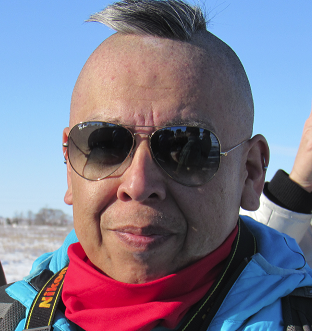A case that lingered for over two years in a state court system involving sex charges against Native American artist Bunky Echo-Hawk has been dismissed by a Tulsa County, Oklahoma district court.

On Friday, August 23, 2024, the State of Oklahoma dismissed two felony charges against Indian Country artist Walter Roy “Bunky” Echo-Hawk Jr. (Pawnee Nation/Yakama Nation) due to a need for additional investigation “to fully develop potential evidence in this case,” according to the motion for dismissal filed in the District Court of Pawnee County.
In February 2022, Echo-Hawk Jr. was criminally charged for allegedly inappropriately touching a minor. Five months later, District Attorney of Pawnee County Mike Fisher added a second felony charge of allegedly possessing child pornography, based on evidence police found during a court-approved search of Echo-Hawk’s home.
The victim, who was under the age of 16 at the time, reported the behavior to a local Department of Human Services (DHS) worker on October 5, 2021, according to documents filed in January by the state of Oklahoma in the District Court of Pawnee County and obtained by Native News Online.
In an interview with a Pawnee County DHS worker, the girl vividly recounted incidents where she was repeatedly touched inappropriately by Echo-Hawk, 48, between “from the time she was 7 or 8 until 11 or 12 years old,” but that she didn’t realize what was happening was sexual in nature until she got older.
Based on the information in the report, Fisher charged Echo-Hawk with lewd or indecent acts to children under 16, a felony and punishable with three to 20 years in jail.
On July 8, 2022, Fisher added a possession of child pornography charge based on evidence police found on Echo-Hawk’s iPad.
“The iPad listed ‘IBunk Pro’ as the device name and the device owner as Walter Echo Hawk,” court documents read. “Located on the device were 9,978 images and of those images, 8,049 were classified as possibly containing images of child sexual abuse.”
Inappropriate images of that “an apparent pre-pubescent” child who is believed to be the victim in this case were also found on the iPad, in addition to “numerous images of apparent child sexual abuse and numerous images of suspected child sexual abuse.”
Echo-Hawk has denied both allegations, calling them “blatantly false,” according to statements from him provided to Native News Online by his attorneys.
The case was transferred for prosecution to the Tulsa County District Attorney’s Office in March 2024, due to a conflict arising from the Osage-Pawnee District Attorney's Office, according to the motion to dismiss.
Echo-Hawk was scheduled for a trial date in spring 2024, but the trial was delayed to allow the district attorney taking on the case, Stephen Kunzweiler, time to familiarize himself with the case.
“It has become apparent to the State of Oklahoma that additional investigation is necessary to fully develop potential evidence in this case,” the motion to dismiss the case, signed by Kunzweiler on August 23, reads.
Echo-Hawk’s attorneys said in a statement to Native News Online that Echo-Hawk has maintained his innocence over the last two and a half years, though he’s been “canceled” by “much of the world” in response to the felony charges he faced.
Kunzweiler did not respond to Native News Online’s request for comment.
More Stories Like This
Native News Weekly (August 25, 2024): D.C. BriefsUS Presidents in Their Own Words Concerning American Indians
Haaland Meets with Southern New Mexico Law Enforcement on Public Safety Priorities
This Day in History – Dec. 26, 1862: 38 Dakota Men Executed by Order of Abraham Lincoln
Merry Christmas 2025
Help us defend tribal sovereignty.
At Native News Online, our mission is rooted in telling the stories that strengthen sovereignty and uplift Indigenous voices — not just at year’s end, but every single day.
Because of your generosity last year, we were able to keep our reporters on the ground in tribal communities, at national gatherings and in the halls of Congress — covering the issues that matter most to Indian Country: sovereignty, culture, education, health and economic opportunity.
That support sustained us through a tough year in 2025. Now, as we look to the year ahead, we need your help right now to ensure warrior journalism remains strong — reporting that defends tribal sovereignty, amplifies Native truth, and holds power accountable.
 The stakes couldn't be higher. Your support keeps Native voices heard, Native stories told and Native sovereignty defended.
The stakes couldn't be higher. Your support keeps Native voices heard, Native stories told and Native sovereignty defended.
Stand with Warrior Journalism today.
Levi Rickert (Potawatomi), Editor & Publisher


